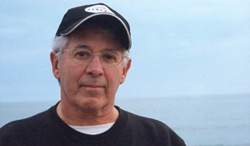Essay: David Hoffman
 |
|
Photo courtesy of David Hoffman |
Motivating teens in science
How do we get more young people interested in doing what it takes to become scientists?
Eva Vertes, a 19-year-old Princeton sophomore, has done great things for Alzheimer’s disease research and is now attacking cancer in a totally new way. When she was 14, she was disinterested in everything, especially reading. Her parents couldn’t get her to read a book. But during a vacation, they gave her the book, The Microbe Hunters, the classic bestseller by Paul de Kruif that dramatizes the pioneering bacteriological work of such scientists as Leeuwenhoek, Spallanzani, Koch, Pasteur, Reed, and Ehrlich.
The results: At 16, Eva won the top Westinghouse Science prize by coming up with something that helps 60 percent of Alzheimer’s patients. At 18, she’s asked some key questions about why cancer cells never attack the heart. She has gotten offers to help develop her ideas from doctors at a major cancer lab in Florida.
What shook Eva to change? What caused her epiphany? A story that had drama, characters that were black and white and gray all over, with passion and risk, heroic protagonists and enemies worthy of that name. (Martin Luther King said that he judged his actions by having "good enemies.") Powerful and possibly positive outcomes, the chance to make a difference: everything a kid needs to get interested and feel connected.
In my time as a documentary filmmaker, I have had to work with scientists and with science presenters who are speaking with targeted and general audiences in the United States and around the world. The results of these experiences have shown me some approaches that I hope will be meaningful to the readers of this magazine, as we try to encourage young people to study science.
One thing that doesn’t work is telling teenagers that they need to learn science, especially if the method attempts to be "clever" or funny. Television specials, including mine, mostly do nothing to help. They often attempt to use history or some other hard information to connect to a gimmick. Teachers force their students to watch the shows; they run one night, and then they are gone. The next science show that pops up on TV is on some other subject and does not provoke kids to feel connected; the potential for passion and personal involvement is lost.
What I’ve learned from making educational programs directly for schools is that young people love to hear about serious and meaningful problems that they can do something about. Places where they can make a difference. Places important to them and their planet.
I believe in real people, and real stories, and even, I guess to some extent, in "reality television." I think that credible stories told in the classical storytelling traditions, and using real people in real situations with real threats, can change the way Americans and especially young people feel about what they personally can do.
Here are some ideas to keep in mind:
- To find the energy to commit to a cause, kids need a personal reason that drives them to take action–a reason that finds a place in their own hearts and minds, a reason that really matters to them.
- To hear and pay attention to a new idea that might interest them, kids need to hear that idea told to them in a story that makes the point and has values that they can attach to.
- Learn from classical drama: kids need strong protagonists and antagonists. In teenage video games, protagonist and antagonists are one-dimensionally black and white, good or bad. However, great stories, stories that can impact your life, have credible characters: heroes are real people, enemies are real people, and the threats they pose are equally real.
I am now working on a family-oriented documentary for the theaters called Dark Matter. Dark matter is mysterious and exciting. It has some good antagonists and some spectacular protagonists. It presents possibilities that I believe will suck in blasé kids, who will find that if they move toward science, they can make a difference–and that their efforts may change our lives for the better. Just like Eva Vertes.
David Hoffman
David Hoffman has been making documentaries for more than 38 years. He has made 88 prime-time TV specials and series, 5 feature-length documentaries, and more than 50 educational programs for children. He has won multiple Emmys, a Peabody award, the Cannes Film Festival Critics Prize, and blue ribbons at numerous US and international festivals. www.thehoffmancollection.com
Click here to download the pdf version of this article.


